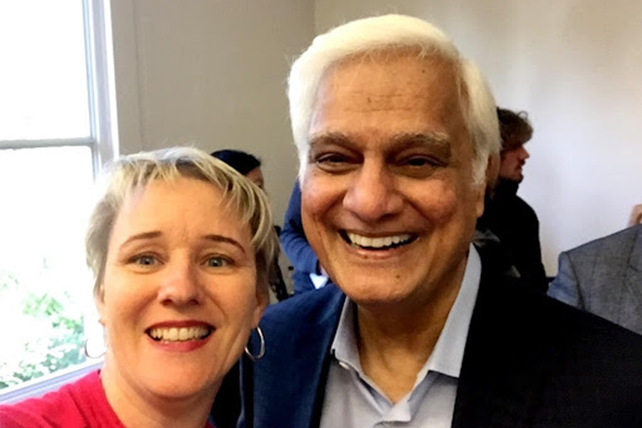Exactly one year ago today, a bomb was dropped not only in my life but arguably the entire evangelical world. That’s when the board of Ravi Zacharias International Ministries (RZIM) released the results of a 4-month long investigation into allegations of sexual misconduct by its late founder, Ravi Zacharias. Turns out it was way worse than anyone had imagined. Thus began the unraveling of a global ministry that Ravi had built over more than four decades.
Having uprooted my life five years earlier to become a student in Oxford, England, at RZIM’s yearlong apologetics course at the Oxford Center for Christian Apologetics (OCCA), I read with horror the full report by Miller & Martin. I wondered if the lucky handful of my former OCCA classmates who had gone on to work at RZIM after our year in Oxford together would even have a job anymore.
I had hoped the inquest would clear his name and restore Ravi’s sterling reputation as the legendary apologist whose talks in college arenas drew crowds worthy of a bowl game. However, just before the end of 2020 the board released a preliminary update, tipping off the world that the final report would not be favorable. In fact, it would be worse than the initial allegations suggested.
Still in shock from reading the report, I recalled the one time I had the privilege to pose a question to Ravi in a question and answer session with my classmates. We were 24 students from six continents, who converged at RZIM’s European epicenter for the 2016-17 school year to be trained in apologetics and evangelism while studying theology full-time at Oxford University. Every cohort had one session with Ravi and this was our turn. Just before Ravi was introduced, we were instructed not to ask apologetics questions because his repertoire of convincing arguments could all be found online and in his books. This was our chance to ask about anything else we wanted to know about him or ministry life. How cool, I thought.
My mind went through a litany of questions that could be interesting fodder for conversation. I skipped past the basic stuff like do you still get nervous when you speak and how much prayer goes into your sermon preparation, which my classmates did ask. I knew this was my shot and I wanted to take it. I had a question in mind but wasn’t sure if it was allowed or appropriate. Since there was no time to vet my question before asking it in a full room of classmates, instructors, and apologists, I took a deep breath and went for it. Here goes nothing.
The question on my heart was informed by my own journey out of sexual brokenness and my previous 16 years of service in sexual redemption ministry as well as the recent moral failings of two prominent pastors from my community in South Florida. Both were forced to resign after admitting to extramarital affairs. Two years later, the ripple effect of those scandals was still being felt, and I hadn’t been able to wrap my head around how and why this storyline seemed to keep playing out.
Knowing I was in a room full of future Christian leaders, I asked more for the sake of the room than to satisfy my own curiosity—not that I thought I had nothing left to learn on this topic. I knew better than to think I had it all together. I also knew it took living with intention to stay pure in a world of risk and opportunity. I wanted this to be a teaching moment to prevent future sex scandals, if nothing else, at least among my peers before they would be scattered across the globe to various ministry assignments. After 40-plus scandal-free years of ministry, I figured Ravi knew a thing or two about what it takes to maintain sexual integrity. Turns out I figured wrong.
Before I asked Ravi what specific safeguards he had in place to keep himself out of the moral mudpit, I prefaced it by asking how he stayed humble in light of the celebrity church culture in America. Like my classmates, I saw him as one of those larger than life Christian leaders with the rockstar platform.
His answer took more than eight minutes and he said all the right things, mentioning the need to be careful about what he called the three G’s (gold, girls, and glory) and discussed the need for accountability. In hindsight, at the time of my question and according to the final report he was likely already wallowing in the moral mudpit. The investigators determined that as early as 2014, Ravi’s sexual misconduct was well underway.
In the past year, I have thought back many times to my question and Ravi’s answer. While he correctly extolled the virtues of accountability, and rightly so, it turns out that accountability without transparency and vulnerability is nothing more than a smokescreen. I wonder if Ravi had not been revered with such high esteem would he have enjoyed the free rein to wreak such devastating consequences.

